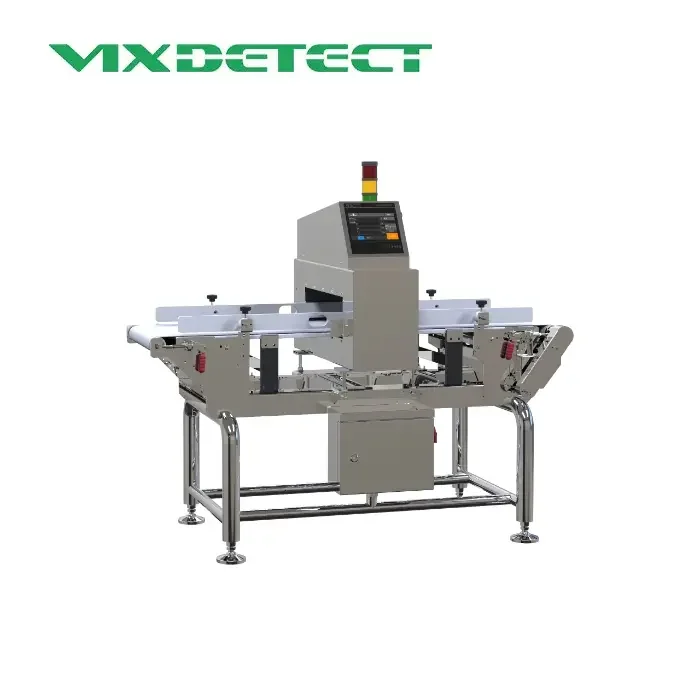What are the applications of food metal detectors?

In modern food production, food safety has become a common concern for both businesses and consumers. The presence of any metal impurities in the food production chain can seriously impact product quality and consumer health. To effectively prevent metal contamination, food metal detectors have become essential safety testing equipment for all types of food processing companies. This article will provide an in-depth analysis of the working principles, application scenarios, operating techniques, maintenance requirements, and future development trends of food metal detectors to help companies better understand and apply this critical equipment.
1. Working Principle of Food Metal Detectors
Food metal detectors primarily rely on electromagnetic induction or multi-frequency induction technology to detect metals in food passing through the device. Their core components include a transmitting coil, a receiving coil, and a control system. During operation, the transmitting coil generates a high-frequency electromagnetic field. When metal impurities pass through the detection port, the electromagnetic field's characteristics change. The receiving coil captures this change and transmits a signal to the control system. After analysis and determination, if the system detects metal impurities, it immediately issues an alarm and automatically rejects the contaminated product. Modern food metal detectors typically use multi-frequency detection technology, enabling them to detect tiny metal particles while also adapting to complex production environments, such as those with high humidity, large temperature fluctuations, or packaged foods.

2. Main Application Scenarios for Food Metal Detectors
Food metal detectors are used in nearly all food processing stages, specifically in the following areas:
2.1 Packaged Food Inspection
During the production of packaged foods, metal detectors can effectively detect metal particles from packaging materials, worn production equipment, or introduced during the production process. For example, candy, biscuits, chocolate, and puffed foods are inspected along conveyor belts to ensure that the final product meets food safety standards.
2.2 Meat Processing
Meat is prone to metal fragments during the cutting, mincing, and curing processes. Using food metal detectors can promptly detect metal impurities from worn knives or dropped from processing equipment, ensuring the safety of meat products. For example, ham, sausage, and fresh meat processing plants all install metal detectors before packaging.
2.3 Frozen Foods
The production of frozen foods carries a high risk of metal contamination, especially with quick-frozen vegetables, seafood, and meat. Food metal detectors can effectively detect products before freezing and shipping, preventing metal contaminants from entering the market.
2.3 Nut and Dried Fruit Processing
Nuts and dried fruits are prone to metal particles being mixed in during processing and packaging, such as metal fragments from production line wear or contaminants from transportation. Metal detectors can screen products before packaging to ensure consumer safety.
2.5 Infant and Toddler Food
Infant and Toddler Food has extremely high safety requirements. Food metal detectors play an irreplaceable role in milk powder, rice cereal, and complementary food production lines, ensuring that products are free of metal contamination.
3. Food Metal Detector Operation and Maintenance
3.1 Correct Operation Methods
Product Settings: Set sensitivity parameters based on food type and packaging material.
Regular Testing: Use standard test strips to ensure the device's sensitivity meets requirements.
Real-Time Monitoring: Continuously monitor metal detector status and alarms during the production process.
Operation Training: Provide professional training to operators to familiarize them with equipment operating procedures and emergency response methods. 3.2 Maintenance Tips
Equipment Cleaning: Keep the conveyor belt and inspection port clean to prevent food residue from affecting detection results.
Regular Calibration: Perform regular calibration according to manufacturer requirements to ensure detection accuracy.
Inspect Circuits and Sensors: Prevent false alarms or missed detections caused by aging circuits or damaged sensors.
Record Inspection Data: Create a inspection log to facilitate traceability and analysis of production quality issues.
4. Advantages of Food Metal Detectors
Improving Food Safety: Food metal detectors can detect minute metal impurities, reducing food safety incidents and enhancing consumer trust.
Reducing Financial Losses: Metal contamination can lead to the scrapping or recall of entire batches of products. Using metal detectors can identify problems early in the production process, minimizing losses.
Meeting International Export Standards: Many countries have strict metal detection standards for imported food, such as the US FDA and the EU HACCP requirements. Installing food metal detectors is essential for exporting.
Improving Production Efficiency: Automated metal detectors provide real-time inspections on the production line, reducing manual spot checks and improving production efficiency.
Food metal detectors have become an indispensable safety barrier for modern food manufacturers. From meat products and frozen foods to infant formula, metal detectors provide businesses with a reliable means of quality assurance. With the continuous advancement of technology and intelligent development, food metal detectors not only improve food safety but also enhance production efficiency and international competitiveness. When selecting metal detectors, businesses should choose the appropriate equipment model and technical solution based on product type, production line environment, and detection requirements to ensure food production safety, quality control, and consumer confidence.
As a professional food metal detector distributor, we specialize in providing highly sensitive and reliable metal detection solutions for all types of food processing companies. Whether it's meat products, frozen foods, nuts and dried fruits, or infant formula and packaged foods, our equipment can effectively detect even tiny metal impurities, ensuring food safety. Leveraging our extensive industry experience and comprehensive after-sales service, we not only provide advanced detection equipment, but also offer operational training, maintenance guidance, and application solutions to help businesses improve production efficiency and ensure product compliance with international export standards and food safety regulations.
www.vixdetect.net
vixdetect